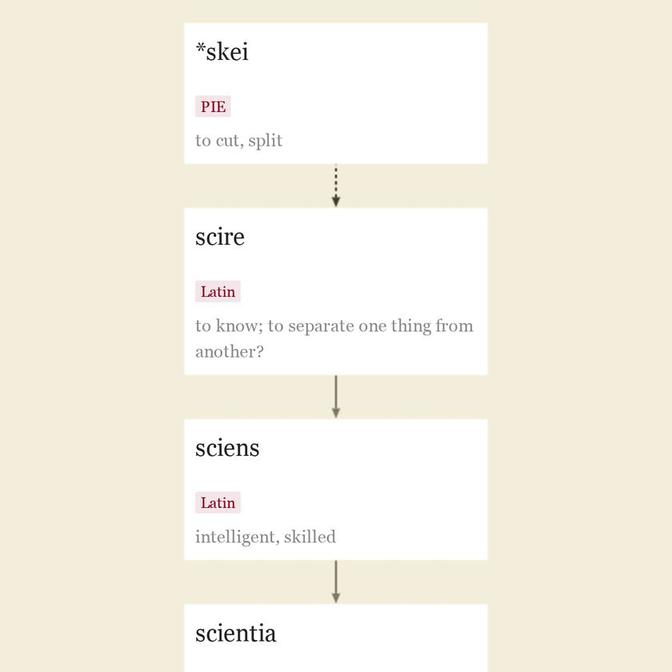prescient (adj.)
"预知,指在事件发生前就已经知道的能力",来自17世纪20年代的法语 prescient(15世纪)和直接源自拉丁语 praescientem(praesciens 主格),是 praescire 的现在分词形式,意为“预先知道”,由拉丁语 prae “之前”(见 pre-)和 scire “知道”(见 science)组成。相关词汇: Presciently。
prescient 的相关词汇
这个词缀的意思是“之前”,源自古法语 pre- 和中世纪拉丁语 pre-,两者都源自拉丁语 prae(副词和介词)“在时间或地点上之前”,源自 PIE 语言的 *peri-(也是 Oscan 语 prai 、Umbrian 语 pre 、梵语 pare “因此”,希腊语 parai “在”,高卢语 are- “在,之前”,立陶宛语 prie “在”,古教会斯拉夫语 pri “在”,哥特语 faura,古英语 fore “之前”的来源),是根源 *per-(1)“向前”,因此是“超出、在前面、之前”的扩展形式。
这个拉丁词在构词动词方面很活跃。另请参见 prae-。有时在中古英语中与 pro- 或 per- 的词混淆。

14世纪中叶,“知道的状态或事实; 通过学习获得的知识; 信息; ”还有“知识的确信,确定性”,源自古法语 science “知识,学问,应用; 人类知识体系”(12世纪),源自拉丁语 scientia “知识,认识; 专业知识”,源自 sciens(属格 scientis)“聪明的,有技能的”, scire 的现在分词“知道”。
拉丁动词中最初的概念可能是“将一件事物与另一件事物分开,区分”,或者“切割”。这与 scindere “切割,分割”有关(源自 PIE 词根 *skei- “切割,分裂”; 希腊语 skhizein “分裂,撕裂”,哥特语 skaidan,,古英语 sceadan “分割,分离”)。
OED 写道,该词在英语中最早的意义现在仅限于神学和哲学。从14世纪末开始,它指的是“书本学问”,也指的是“特定的知识领域或学科,系统化的关于特定对象群的知识”; 还有“技能,聪明才智; 狡猾”。从约1400年开始,它指的是“经验性知识”; 还指“训练所得的技能,手艺; 一门行业”。
从14世纪末开始,它更具体的意义是“人类集体知识”,尤其是通过系统观察、实验和推理获得的知识。现代(限定的)意义上的“关于特定主题或推测的一系列常规或系统观察或命题”的概念可以追溯到1725年; 在17世纪至18世纪,这通常是 philosophy。
“非艺术学科”的意义可追溯到1670年代。通常理解的区别是希腊语 epistemē 的理论真理和实现实际结果的方法(tekhnē),但有时 science 用于实际应用, art 用于技能应用。
主要的现代用法,“自然和物理科学”,通常限于对物质宇宙及其规律现象的研究,可追溯到19世纪中叶。
The men who founded modern science had two merits which are not necessarily found together: Immense patience in observation, and great boldness in framing hypotheses. The second of these merits had belonged to the earliest Greek philosophers; the first existed, to a considerable degree, in the later astronomers of antiquity. But no one among the ancients, except perhaps Aristarchus, possessed both merits, and no one in the Middle Ages possessed either. [Bertrand Russell, "A History of Western Philosophy," 1945]
创立现代科学的人们具有两个不一定同时具备的优点:对观察的极大耐心和对假设的大胆。这两个优点早期的希腊哲学家拥有; 第一个优点在古代后期的天文学家中也存在相当程度; 但古代没有人同时具备这两个优点,中世纪也没有人具备其中任何一个。[伯特兰·罗素,《西方哲学史》,1945年]
Science, since people must do it, is a socially embedded activity. It progresses by hunch, vision, and intuition. Much of its change through time does not record a closer approach to absolute truth, but the alteration of cultural contexts that influence it so strongly. Facts are not pure and unsullied bits of information; culture also influences what we see and how we see it. Theories, moreover, are not inexorable inductions from facts. The most creative theories are often imaginative visions imposed upon facts; the source of imagination is also strongly cultural. [Stephen Jay Gould, introduction to "The Mismeasure of Man," 1981]
科学是一种社会嵌入的活动,因为人们必须进行科学研究。它通过直觉、视野和直觉来进步。它的变化往往不是接近绝对真理的结果,而是文化背景的改变对其产生了强烈影响。事实并不是纯粹而无瑕的信息碎片; 文化也影响我们看到事物的方式。此外,理论并不是从事实中不可避免地归纳出来的。最有创造力的理论往往是对事实施加的富有想象力的愿景; 想象力的源泉也在很大程度上受到文化的影响。[斯蒂芬·杰·古尔德,《人的错误测量》,1981年]
原始印欧语根词,意为“切割,分裂”,是根词 *sek- “切割”的扩展。
它构成或部分构成以下单词: abscissa; conscience; conscious; ecu; escudo; escutcheon; esquire; nescience; nescient; nice; omniscience; omniscient; plebiscite; prescience; prescient; rescind; rescission; science; scienter; scilicet; sciolist; scission; schism; schist; schizo-; schizophrenia; scudo; sheath; sheathe; sheave(n.)“凹槽轮,用于接收绳索,滑轮”; shed(v.)“脱落”; shin(n.)“小腿前部”; shingle(n.1)“薄木片”; shit(v.); shive; shiver(n.1)“小块,碎片,碎片,碎片”; shoddy; shyster; skene; ski; skive(v.1)“切成条状,削减,磨掉”; squire。
它是以下单词的假定来源/其存在的证据由以下单词提供:梵语 chindhi, chinatti “打破,分裂”; 阿维斯塔语 a-sista- “未分裂,未受损”; 希腊语 skhizein “分裂,劈开,分离”; 拉丁语 scindere “切割,撕裂,撕裂,分裂”; 亚美尼亚语 c'tim “撕裂,划痕”; 立陶宛语 skiesti “分离,分割”; 古教会斯拉夫语 cediti “过滤”; 古英语 scitan,古诺尔斯语 skita “排便”; 古英语 sceað,古高地德语 sceida “鞘”; 古爱尔兰语 sceid “呕吐,吐出”; 威尔士语 chwydu “打开”。